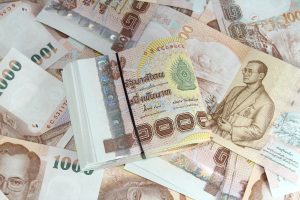When Prime Minister Srettha Thavisin’s coalition government came to power in Thailand last year, it made a lot of big promises. Perhaps the biggest, and also most controversial, was a one-time 500 billion baht cash handout. Basically, Thailand’s economy has been slower to recover from the pandemic than some of its peers, and the idea is that a big stimulus will help jump-start growth.
It’s not clear if this will actually boost growth, but the government seems pretty set on the idea. Most adults in Thailand will receive a one-time disbursement of 10,000 baht through a digital wallet, which they can spend on various consumer goods and services. At today’s exchange rate, the total cost of the program will be about $13.6 billion.
When the plan was floated, it was unclear how it would be funded. The Thai government does not like to run large fiscal deficits or borrow heavily; so options for funding a big stimulus were limited. It was unlikely it would borrow an additional $14 billion in a single fiscal year to fund its digital wallet scheme, and the central bank has not shown a willingness to do unconventional things like monetize public debt the way Bank Indonesia did during the pandemic. Now we have a clearer idea of what the plan actually is.
According to preliminary reports, $4.8 billion will be funded from this year’s national budget, and an additional $4.2 billion will be drawn from next year’s budget. This means the direct hit to the national budget will total around $9 billion and be spread out over two years. I will cover Thailand’s 2024 budget in more depth in a later column, but spreading the cost of the stimulus out over two years does theoretically ease the state’s fiscal burden and make the plan more feasible.
However, this still leaves the program almost $5 billion short of its goal. To bridge this gap, Srettha announced last week that the government would seek approval to obtain a loan from the Bank for Agriculture and Agricultural Cooperatives (BAAC) to cover the difference, which is 172 billion baht or about $4.7 billion. The 500 billion baht question now is: does this plan make sense?
On its face, it raises some questions. The BAAC is a rural development bank founded in 1966, and owned by the Ministry of Finance. The purpose of this bank is to provide credit and loans to farmers and rural businesses. They have a large loan portfolio totaling around $45 billion as of March 2023, but their margins are thin. Over the last five years, net profit averaged $240 million a year. This is what you would expect from a state-owned rural development bank because the main purpose of such a bank is to extend credit to farmers, not to generate returns for shareholders.
Now the government is asking the BAAC to do something that is not part of its remit, which is to loan the state nearly $5 billion to finance a big stimulus program. But it is not clear exactly where the money will come from. As of March 2023, the BAAC had $50 billion in deposits, which puts the loan to deposit ratio at about 89 percent.
$4.7 billion in new lending would increase the loan portfolio by 11 percent and push the loan-to-deposit ratio closer to 100 percent, which is technically feasible but risky because it makes it harder for the bank to cover its liabilities if there is some type of liquidity crunch. Srettha already made a statement reassuring people that there was no run on the bank after the plan become public.
It should be noted that other countries in the region have started asking state-owned banks to do unusual things as well, such as the Philippines using two of its development banks to fund a sovereign wealth fund or Indonesia seeding its state-owned investment fund with shares from a pair of state-owned banks. So this idea, at least in principle, is not unheard of. But in Thailand’s case, it is a bit risky and complicated. It might be more effective and simpler, if instead of contorting its balance sheet to fund a one-time stimulus, the BAAC simply provided more long-term debt relief to its existing rural borrowers.
































